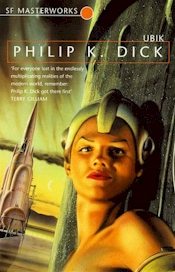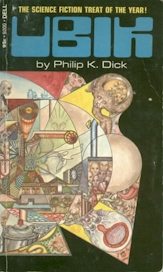
USA Vintage Books trade edition
216 pages (left)
cover design by Heidi North
cover photograph by Digital Art/Westlight
UK Gollancz SF Masterworks paperback
224 pages (right)

Denver Science Fiction & Fantasy Book Club |

|
Ubik (1969) USA Vintage Books trade edition 216 pages (left) cover design by Heidi North cover photograph by Digital Art/Westlight UK Gollancz SF Masterworks paperback 224 pages (right) |

|
|
Amy's summary :
Ubik - Philip K. Dick
Ubik is a book filled with quirky details. It was first published in 1969, and is set in 1992, but doesn't feel all that dated. Runciter Associates is an anti-psi or "prudence organization", that uses people who are "inertials" to nullify privacy intrusions by telepaths and precogs. It's headed by Glen Runciter, who consults on business decisions with his dead wife, Ella, who is in half-life at the Beloved Brethren Moratorium in Zurich. Joe Chip is a psi tester working for Runciter, who is so broke he can barely afford his apartment's coin operated door. A scout brings Pat Conley to him; a woman with a dangerous talent to counter precogs by changing the past, and by changing the past she consequently changes the present. Runciter Associates is contracted to block psi talents at a research facility on the Moon. A team is put together of eleven inertials including Pat, plus Joe and Runciter. Once on Luna, the contract is revealed to be a trap. A humanoid bomb explodes, Runciter is killed, and the rest of the team escapes back to Earth, and the North American Confederation. The Beloved Brethren Moratorium is unable to obtain an adequate photophasonic flow to revive dead Runciter into half-life, but Runciter keeps manifesting to the team. Runciter's voice is on Joe's phone; a matchfolder proclaims Runciter is getting rich despite being frozen; cryptic messages on bathroom walls are in Runciter's handwriting; Runciter's face appears on money. A process of temporal deterioration is adversely affecting the team. There's an out-of-date phone book, stale cigarettes, obsolete money, clotted cream, and scummy coffee. Tape recorders and elevators are becoming outdated models. Worse, Wendy, one of the survivors who said she felt old after the bomb blast, is later found dead; a dehydrated, shriveled heap. Runciter is seen on TV promoting a wonder product in a spray can called Ubik. Ubik can supposedly support reality, and banish even unglimpsed manifestations of decay. But even Ubik can regress to Ubik liver and kidney balm, and Elixir of Ubique. Joe Chip goes to Des Moines for Runciter's funeral, where he hopes to find answers. There he meets the other surviving members of the team. Technology is devolving around them back to 1939. Are the regressions due to Pat's talent, or are other forces at play? summary written by misuly@aol.com |
 |
Ubik Another book cover: first paperback printing, 1970 Dell Books, 208 pages cover art by Jones |
| Dan | 7 | Amy | 9 |
 |
10 Wow! Don't miss it 8-9 Highly recommended 7 Recommended 5-6 Mild recommendation 3-4 Take your chances 1-2 Below average; skip it 0 Get out the flamethrower! U Unfinishable or unreadable - Skipped or no rating given |
| Cheri | 9 | Barb | 7 | ||
| Aaron | - | Cynthia | - | ||
| Jackie | 8 | Ron | 8 | ||
| Sara | - |